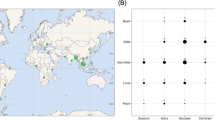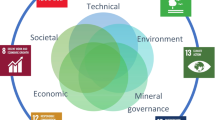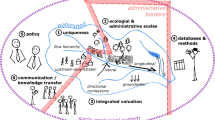Abstract
As part of the commitments made by the governments of Canada and the United States in the Great Lakes Water Quality Agreement, Remedial Action Plans (RAPs) are being developed and implemented at Great Lakes Areas of Concern. The Areas of Concern are specific places around the Great Lakes basin ecosystem where environmental quality is degraded to the point that certain beneficial uses (the ability of fish, wildlife and humans to thrive) are impaired. According to the United States and Canada Great Lakes Water Quality Agreement of 1987, the federal governments, in cooperation with state and provincial governments, are to ensure the public is consulted throughout the development and implementation of the RAPs. While not explicit in the Agreement, it is logical to posit that given the effort and investment in environmental improvements, community capacity to sustain the recovery of beneficial uses beyond the life of the RAP should be a product of the RAP. This report examines a case study to test the hypothesis that public ownership of the RAP process can result in the development of community capacity to sustain environmental recovery. The question is, were the principles of the RAP, 10 years after delisting, taken into account to ensure sustainability of growth along the waterfront and within the Town? To arrive at the answer it is important to explore the approach used in the Collingwood Harbour RAP process, and concepts and principles of sustainable cities and towns. This paper provides evidence that such principles are being applied in Collingwood and were nurtured during the development and implementation of the RAP.
Similar content being viewed by others
References
Aalborg: 2004, http://www.iclei.org/home/documents/press_release_11june2004.doc
D.R. Boyd (2004) Sustainability within a Generation. A New Vision For Canada David Suzuki Foundation Canada
Collingwood: 2004, http://www.town.collingwood.on.ca/
InstitutionalAuthorNameCollingwood Harbour RAP (1994) Planning for the Future, A report to Collingwood Town Council. Coastline Development and Sustainability Subcommittee Collingwood Ontario
G. Costanza (1992) Ecological economics of sustainability: investing in natural capital R.. Goodland H.E. Daly S.E. Serafy (Eds) Population, Technology and Lifestyle Island Press Washington DC 106–118
Florida, R.: 2002, ‘Competing in the age of talent: quality of place and the new economy’, http://www.heinz.cmu.edu/~florida
Fram Boldig Group and Slokker Canada Corp. 2004, The Shipyards (Marketing Materials)
A. Gurtner-Zimmermann (1995) ArticleTitleA mid-term review of Remedial Action Plans: Difficulties with translating comprehensive planning into comprehensive actions Journal of Great Lakes Research 21 234–247.
J.H. Hartig N.L. Law D. Epstein K. Fuller J. Letterhous G. Krantzberg (1995) ArticleTitleCapacity-building for restoring degraded areas in the Great Lakes International Journal of Sustainable Development and World Ecology 2 1–10 Occurrence Handle10.1080/13504509509469885
J.H. Hartig M.A. Zarull (Eds) (1992) Under RAPs. Toward Grassroots Ecological Democracy in the Great Lakes Basin University of Michigan Press Ann Arbor, Michigan
ICLIE-UNEP: 2002, The Melbourne Principles For Sustainable Cities Institute for Sustainable Communities 2004: http://www.iscvt.org/FAQscdef.html
InstitutionalAuthorNameInternational Joint Commission (1978) Great Lakes Research Advisory Board. The Ecosystem Approach. Special Report to the International Joint Commission Windsor Ontario
InstitutionalAuthorNameInternational Joint Commission (1996) Position Statement on the Future of Great Lake Remedial Action Plans. Report of the Water Quality Board Windsor Ontario, Canada
InstitutionalAuthorNameInternational Joint Commission (2003) The Great Lakes Areas of Concern Report Windsor Ottawa, Washington
G. Krantzberg (1997) ArticleTitleInternational Association for Great Lakes Research Position Statement on Remedial Action Plans Journal of Great Lakes Research 23 221–224
G. Krantzberg (2003) ArticleTitleKeeping Remedial Action Plans on target: lessons learned from Collingwood Harbour Journal of Great Lakes Research 29 641–651
G. Krantzberg E. Houghton (1996) ArticleTitleThe Remedial Action Plan that lead to the cleanup and delisting of Collingwood Harbour as an Area of Concern Journal of Great Lakes Research 22 469–483 Occurrence Handle1:CAS:528:DyaK28Xltlejsrw%3D
B.J. Lee H.A. Regier D.J. Rapport (1982) ArticleTitle‘Ten ecosystem approaches to the planning and management of the Great Lakes’ Journal of Great Lakes Research 8 505–519 Occurrence Handle10.1016/S0380-1330(82)71989-6
Moore,J.L.:1994,What’s Stopping Sustainability? http://www.newcity.ca/Pages/mooreindex.html
NRTEE:(2002), Environmental Quality in Canadian Cities: The Federal Role, http://www.nrtee-trnee.ca/eng/main_e.htm
R. Putnam R. Leonardi R.Y. Nanetti (1993) Making Democracy Work: Civic Traditions in Modern Italy. N.J Princeton University Press Princeton
W.E. Rees R. Mark (1991) ArticleTitle‘Sustainable communities: planning for the 21st Century’ Plan Canada 31 15–26
Sproule-Jones (2002) The Restoration of the Great Lakes University of British Columbia Press
Sustainable Cities: 2004, http://www.sustainable- cities.org.uk/institute/index.html
Town of Collingwood: 2002, Vision 2020 Report No. 6 – The Waterfront, http://www.town.collingwood.on.ca/living_news.cfm?category=25
Town of Collingwood: 2004, http://www.collingwood.ca/visiting_tourism.cfm?action=list&type=1&topic=1
UN-HABITAT: 2002, Sustainable Urbanisation Achieving Agenda 21. ISBN 92-1-131671-5. The UNEP-International Environment Technology Centre 2004. Environmental Management and Community Participation: Enhancing Local Programmes UNEP-IETC Urban Environment Series Copyright © 2004-5 UNEP-IETC
United States and Canada: 1972, Great Lakes Water Quality Agreement
United States and Canada: 1978, Revised Great Lakes Water Quality Agreement
United States and Canada: 1987, Revised Great Lakes Water Quality Agreement of 1978 as Amended by Protocol Signed November 18, 1987. Consolidated by the International Joint Commission
Author information
Authors and Affiliations
Additional information
Readers should send their comments on this paper to: BhaskarNath@aol.com within 3 months of publication of this issue
Rights and permissions
About this article
Cite this article
Krantzberg, G. Sustaining the Gains Made in Ecological Restoration: Case Study Collingwood Harbour, Ontario. Environ Dev Sustain 8, 413–424 (2006). https://doi.org/10.1007/s10668-005-8504-7
Received:
Accepted:
Issue Date:
DOI: https://doi.org/10.1007/s10668-005-8504-7




